- Home
- Karen Marie Moning
The Highlander's Touch Page 4
The Highlander's Touch Read online
Page 4
“But you had best be aware,” Galan warned, “that if you doona kill her, and should any of the Templars discover who she is and the nature of the oath you swore, the knights will lose faith in your ability to lead. They will see a vow broken as an unforgivable weakness. The only reason they agreed to fight for our country is because of you. Sometimes I think they would follow you into hell. You know they are fanatic in their beliefs. To them, there is no justification for breaking an oath. Ever.”
“Then we will not tell them who she is or what I swore, will we?” Circenn said softly, knowing the brothers would support his decision whether they agreed with it or not. The Douglases always stood behind the laird and thane of Brodie—an ancient blood oath had united the two clans long ago.
The brothers studied him, then nodded. “It will remain between us until you reach your decision.”
* * *
Breathing deeply of the crisp, cool air, Circenn paced the courtyard while the woman waited in his chambers for mercy that was not his to grant. He struggled to harden himself against her. He had lived so long by the rules that he almost hadn’t heard his conscience clamor when he’d raised his sword to her neck. While his warrior’s training had insisted he honor the vow, a thing he had thought dead in him had undermined his resolution.
Compassion. Sympathy. And an insidious little voice that had softly, but relentlessly, questioned the sagacity of his rules. He had recognized that voice; it was doubt—a thing he hadn’t suffered for an eternity.
I swear to kill the bearer of the flask, he had pledged years ago.
A warrior’s oaths were his lifeblood, an unbreakable code by which he lived and died. Circenn Brodie’s rules were the only thing standing between him and a swift descent into chaos and corruption. What was the solution?
She must die.
She.
By Dagda, how could it be a woman? Circenn liked women; he had adored his mother and treated all women with the same deference and courtesy. He felt women exhibited some of the best characteristics of humanity. Circenn was Brude, whose line of royal succession was matrilineal. Years ago, when Circenn had sworn his oath to Adam Black, he had not once considered that the flask might be found by a woman, and such a delightful one at that. When he’d torn the strange bonnet from her head, her thick hair had cascaded nearly to her waist in a fall of copper and gold highlights. Green eyes, uptilted at the outer corners, had widened with fear, then quickly narrowed with anger as she’d pronounced the bonnet a gift from her da. It was only fitting that he return the family heirloom, no matter how ugly it was.
Unusually tall for a woman, and lithe, her breasts were full and firm, and he had glimpsed the press of her nipples against the thin fabric of her strange garment. Her legs were generously long—long enough to wrap around his waist and permit her to comfortably cross her ankles while he buried himself between them. When she had bent to retrieve her bonnet he’d nearly snaked an arm around her waist, pulled her against him, and let his demanding nature take free reign. And then slit her throat when your desire was sated?
She. Had Adam suspected that the bearer of the flask might be a female? Might he have seen into the future with his fairy vision and even now be laughing at his dilemma? Yet, if he hadn’t used a binding curse in the first place, the woman’s life wouldn’t be in danger now. It was his inept curse that had brought her here, and now he was supposed to kill the unsuspecting soul. Unless he found some proof of duplicity on her part, her death would be innocent blood on his hands that would haunt him for the rest of his life.
Circenn girded his will, conceding that the best solution was to kill her. He would fulfill his oath; then, come tomorrow, life would be normal again. He would secure the flask in the secret place with the other hallows and continue their war. He would return to his tidy regimen and find solace in knowing that he would never become the abomination he so feared he had the potential to be. Circenn Brodie’s primary goal was to see the Bruce securely on the throne of Scotland.
Upon the English king Longshanks’ death, his son Edward II had continued his father’s war, relentlessly chipping away at Scotland’s heritage. Soon nothing of their unique culture would remain. They would be Britons: weak and obedient, taxed into starvation and submission. Their greatest hope against the ruthless king of England was the renegade Templars who had sought sanctuary at Castle Brodie.
Circenn blew out a breath of frustration. The persecution of the Templars grieved and infuriated him. He had once considered joining the renowned Order of warrior-monks, but some of their rules hadn’t been quite to his taste. He’d settled instead for working closely with the religious knights, since both he and the Order protected hallowed artifacts of immense value and power. Circenn respected the Order’s many causes, and knew its history as well as any Templar.
The Order had been founded in 1118 when a group of nine predominantly French knights had gone to Jerusalem and petitioned King Baudouin to allow them to live in the ancient ruin of the Temple of Solomon. In exchange, the nine knights had offered their services to protect pilgrims traveling to the Holy Land from robbers and murderers along the public highways leading into Jerusalem. In 1128, the Pope had given his official approval to the Order.
The knights had been handsomely paid for their services, and the Order had increased dramatically in numbers, wealth, and power through the twelfth and thirteenth centuries. By the fourteenth century, the Order owned over nine thousand manors and castles across Europe. Independent of royal or episcopal control, the Order’s profits were free of taxation. The Order’s many estates were farmed, producing revenues that served as the basis for the largest financing system in Europe. In the thirteenth and fourteenth centuries, the Parisian Order of the Templars virtually functioned as the French Royal Treasury, lending large sums to European royalty and individual nobles. However, as the Templars’ wealth and power increased, so did the suspicion and jealousy among some members of the nobility.
Circenn hadn’t been surprised when the Order’s success became the very reason for its downfall. He’d anticipated it, yet been helpless to prevent it; the politics of Pope and king were too mighty for one man to influence.
Circenn recalled well how, nearly a dozen years past, the Templars’ wealth had drawn the deadly attention of the French king, Philippe the Fair, who was desperate to line his coffers. In 1305, Philippe maligned the Order, convincing Pope Clement V that the Templars were not holy defenders of the Catholic faith, but rather seeking to destroy it.
Philippe campaigned exhaustively against the knights, and accused the Templars of heinous acts of heresy and sacrilege. In 1307, the Pope gave the king the order he’d been waiting for: the right to arrest all the Templars in France, to confiscate their properties, and to direct an inquisition. So the infamous, bloody, and biased trial of the Templars had begun.
Circenn ran a hand through his hair and scowled. Knights had been arrested, imprisoned, and forced through torture to confess to sins of Philippe’s choosing. Even more had been burned at the stake. In trial, the knights had been permitted no defense advocates; they had not even been allowed to know the names of their accusers and witnesses against them. The so-called “trial” had been a witch-hunt, deviously orchestrated to strip the Templars of their fabulous riches. Adding insult to injury, the Pope had issued a papal bull that suppressed the Order and denied it recognition. The few knights who managed to escape imprisonment or death had become outcasts, without country or home.
When Circenn had realized the knights’ downfall was inevitable, he had hastened to meet with Robert the Bruce and, with Robert’s approval, had sent word to the Order that they would be welcomed in Scotland. Robert had offered them sanctuary, and in return, the powerful warrior-monks had turned their fighting skills to the battle against England.
The Templars were formidable warriors, trained in weaponry and strategy, and they were essential to Scotland’s cause. Over the past few years, Circenn had been stealthily slipping
them into the Bruce’s troops as commanders, with the Bruce’s assent. Already the Scots were warring better, implementing cunning strategies, and winning minor battles.
Circenn knew that if he faltered now, if he began to break oaths or did anything that jeopardized the Templar’s loyalty, he might as well throw away the past ten years of his life, along with his love for his motherland.
* * *
Lisa had no idea how much time had passed since she’d sat on the floor. But it was long enough for her to realize that time didn’t pass in such a fashion for dreamers. If one sat still in a dream and did nothing, the dream either ended or moved on to some new and incredible adventure colored by shades of the absurd. Absurd like the proportions of that man’s body, she thought irritably.
Pushing herself up from the floor with her hands, she paused in a crouch, observing the wide, flat stones beneath her palms. Cool. Hard. Dry, with a skimming of stone dust. Entirely too tangible. Rising to her feet, she began to examine her surroundings.
The chamber was large, lit by fat, soapy candles. The walls, fashioned of massive stone blocks, were hung with random tapestries. A huge bed occupied the center of the room, and several chests were scattered about with neatly folded fabrics piled atop them. The room was spartan, tidy. The fireplace was the only concession to atmosphere; there was not a single woman’s touch in the room. Pausing near the bathtub, she dipped her hand in the water; tepid—another sensation too tangible to deny.
She moved to the fireplace and flinched at the confoundingly real sensation of warmth. She studied the flames a moment, marveling that the rest of the room was so chilly when the hearth was throwing off such a blaze. It was as if the fire were the sole source of heat, she thought. Struck by that notion, she briskly walked the perimeter of the room. Her suspicion was quickly confirmed: There was not one heating vent in the entire chamber. No radiators in the corners collecting dust. No little metal vents in the floors. No pipes or, for that matter, a single electrical outlet. No phone jack. No closets. The door was made of what looked like solid oak; no hollow-core veneer there.
She took a deep, calming breath and assured herself that she must have overlooked something, at least in terms of the heating. Circling the room a second time, she surveyed every nook and cranny as she trailed her hand along the wall—another way of testing the solidity of her prison. Her fingertips brushed a thick tapestry that yielded beneath them and felt far colder than the stones. The rough fabric shivered beneath her palm as if the wind were batting at it from the other side. Mystified, she tugged it aside.
She lost her breath in a sudden rush of air. The view from the window struck her as intensely as an unexpected blow to her stomach.
She gazed out upon a misty night from ancient history.
Fifty feet above the ground, she was in a stone castle that stood on an island promontory surrounded by a thundering sea. Waves hurled themselves at the rocky crags, breaking into foam and becoming one with the mist that swirled up from the black surface of the ocean. On a cobbled walkway, men carrying torches moved silently between the castle and small outbuildings. The distant cry of a wolf competed with faint strains of bagpipes. The night sky was blue-black, tinted purple where it met the water, dancing with thousands of stars and a thin scythe of a moon. She’d never seen so many constellations in Cincinnati; smog and the halo effect of the brilliantly lit city dimmed such beauty. The view from the window was breathtakingly stark, majestic. A bitter wind howled up from the sea and across the promontory, buffeting the tapestry in her hand.
She dropped it as if she’d been burned and it fell across the window, blessedly sealing out the inexplicable vista. Unfortunately, as her eyes focused on the tapestry, she discovered a new horror. It was brilliantly woven and far too detailed: a warrior riding a horse into battle while an army of men clad in bloodstained plaid cheered. At the bottom of the hanging, embroidered in crimson, were four numbers that chipped away at her sanity: 1314.
Lisa moved to the bed and sank limply onto it, her energy sapped by the successive shocks. She stared blankly at the bed for a moment, then her hand flashed out and poked frantically at the mattress as she tested another part of her environment. Not your run-of-the-mill Serta Sleeper here, Lisa. Filled with a growing sense of panic, she pulled back the tightly tucked blankets and was momentarily sidetracked by the fragrance that clung to the linens. His scent: spice, danger, and man.
Firmly ignoring a desire to bury her nose in the sheets, she tugged at the mattress, which was little more than thin pallets laid atop one another encased in bristly fabric. One crunched like dried brush, the next seemed stuffed with lumpy wooly stuff, and the top had the feel of limp feathers. For the next twenty minutes Lisa scrutinized her surroundings, driven by increasing desperation. The stones felt cool, the fire felt hot. The liquid in the cup near the bed tasted vile. She heard the bagpipes. Every sense she possessed was activated by her tests. Absently, she swiped at her neck with the back of her hand, and when she drew it away a single drop of blood lay crimson upon her skin.
She understood with sudden certainty that she should never have touched the flask. Although it defied rational explanation, she was neither in Cincinnati nor in the twenty-first century. She felt the last of her hope that she was dreaming slip from her tenuous grasp. Dreams she knew well. But this was too real to be a dream, detailed far beyond her mind’s ability to fabricate.
Give me the flask, he’d demanded.
You see this? This is part of the dream? She’d been astonished.
But now, reflecting upon it, she realized that he’d seen it because it was not part of a dream. It was part of reality, his reality, a reality she now shared. That it was the flask she had touched just before she’d started to feel like she was falling, and the flask that he’d demanded, seemed too logical a connection to exist within a dream. Had the flask somehow carried her back to a man who had direct or indirect proprietary rights to it? And if so, was she truly in the fourteenth century?
With growing horror, she saw the frightening pattern: His odd manner of dress, his intent perusal of her clothing as if he’d never seen the like before, the primitive wooden tub situated before the fire, the strange language he’d spoken, the tapestry on the wall. All of it hinted at the impossible.
Stricken, she glanced around the room, reassessing it from a different perspective. She viewed it as her employment in the museum had led her to believe a medieval chamber would appear.
And all the oddities made perfect sense.
Logic insisted she was in a medieval stone castle, and according to the wall hanging, at some point in the fourteenth century, despite the improbability of it.
Lisa blew her breath out in a frantic attempt to calm down. She couldn’t be somewhere else in time, because if this was medieval Scotland, Catherine was some seven hundred years in the future—alone. Her mother desperately needed her and had no one else to rely on. That was unacceptable. Being stuck in a strange dream was now relegated to the minor problem it would have been, had it been true. A dream would have been easy to manage; eventually she would have awakened, no matter how awful things had been in the dream. If she was actually in the past, which was what all her senses insisted, she had to get back home.
But how?
Would touching the flask do it again? As she pondered that possibility she heard footsteps in the corridor outside the chamber. She moved quickly to the door, debated cowering behind it, then pressed her ear to it instead. It would be wise to discover everything she could about her environment.
“Do you think he’ll do it?” a voice echoed in the hall.
There was a long silence, then a sigh so loud that it carried through the thick wood. “I believe so. He does not take oaths lightly and knows the woman must die. Nothing can come in the way of our cause, Duncan. Dunnottar must be held, that bastard Edward must be defeated, and oaths sworn must be honored. He will kill her.”
As the steps faded down the corridor, Lisa leaned
limply against the door. There was no doubt in her mind exactly which woman they’d meant.
Dunnottar? Edward? Dear God! She hadn’t merely traveled through time—she’d been dropped smack into the sequel to Braveheart!
IT WAS LATE AT NIGHT WHEN CIRCENN QUIETLY EASED his chamber door open a few inches. Peering through the narrow aperture, he saw that the room was dark. Only a faint bar of moonlight fell from behind the tapestry. She must be sleeping, he decided, which would give him the advantage of surprise. He would get this over with, quickly.
He swung the door open, stepped into the room with swift conviction, and promptly lost his footing. As he hit the floor of his chamber, he cursed; it had been cunningly littered with sharp pieces of broken stoneware. He scarcely had time to register that he’d tripped over a taut and cleverly tied cord, when he was smashed on the back of his head with a stoneware basin. “By Dagda, lass!” he roared, rolling over on his side and clutching his head. “Are you trying to kill me?”
“Of course I am!” she hissed.
Circenn could discern nothing more than a blur of motion in the darkness when, much to his astonishment and pain, she kicked him in a most sensitive part of his body—a part most women touched reverently. When he doubled over, his hands grazed more of the jagged shards on the floor, and he winced. She leaped over his body like a frightened doe, bounding for the open doorway.
Deadening himself to the pain, he moved swiftly. His hand flashed out and fastened on her ankle. “Leave this room and you are dead,” he said flatly. “My men will kill you the moment they see you.”
“So what’s the difference? You will too!” she cried. “Let go of me!” She kicked ineffectually at the hand clasped around her ankle.
He growled and banged the door shut with his foot. Then, pulling on her ankle, he caused her to lose her balance and brought her crashing down on top of him. He’d tried to roll her toward him as she fell to keep her from striking any of the stoneware she’d so deviously strewn about, but she bucked as she hit him and bounced over his side. A grapple ensued and she fought him with a surprising amount of courage and strength. Aware of his superior brawn, he focused his efforts on subduing her without hurting her or allowing her to harm herself. If anyone was going to be harming her, it was he.

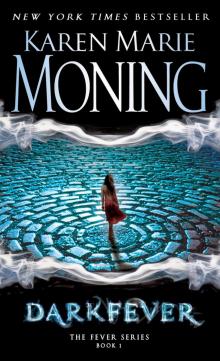 Darkfever
Darkfever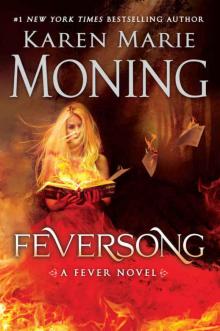 Feversong
Feversong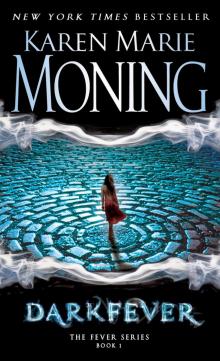 Faefever
Faefever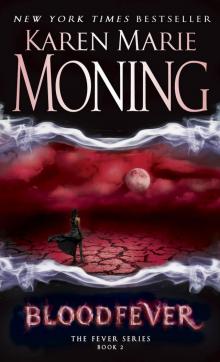 Bloodfever
Bloodfever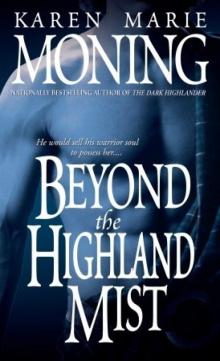 Beyond the Highland Mist
Beyond the Highland Mist Iced
Iced High Voltage
High Voltage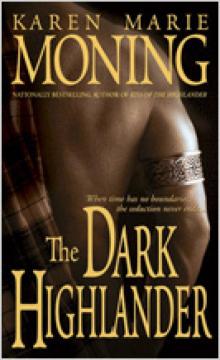 The Dark Highlander
The Dark Highlander Shadowfever
Shadowfever The Highlander's Touch
The Highlander's Touch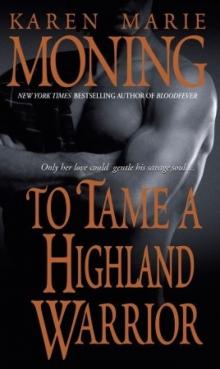 To Tame a Highland Warrior
To Tame a Highland Warrior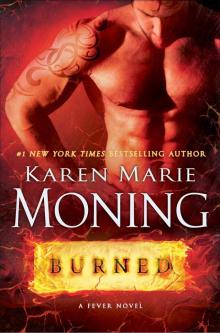 Burned
Burned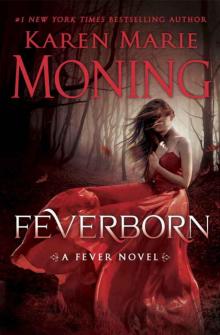 Feverborn
Feverborn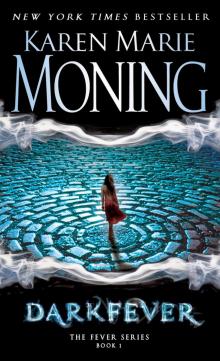 Dreamfever
Dreamfever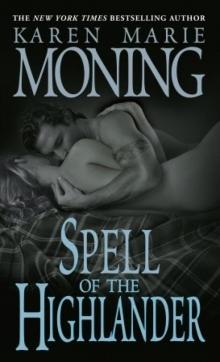 Spell of the Highlander
Spell of the Highlander Kiss of the Highlander
Kiss of the Highlander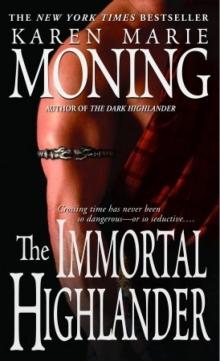 The Immortal Highlander
The Immortal Highlander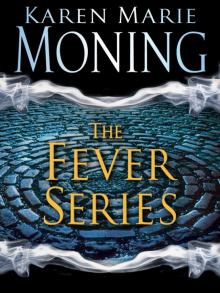 Karen Marie Moning’s Fever Series 5-Book Bundle: Darkfever, Bloodfever, Faefever, Dreamfever, Shadowfever
Karen Marie Moning’s Fever Series 5-Book Bundle: Darkfever, Bloodfever, Faefever, Dreamfever, Shadowfever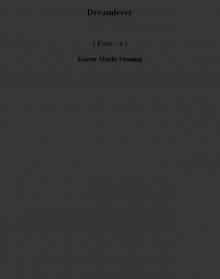 Dreamfever f-4
Dreamfever f-4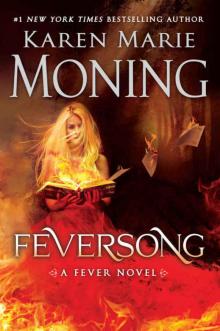 Feversong: A Fever Novel
Feversong: A Fever Novel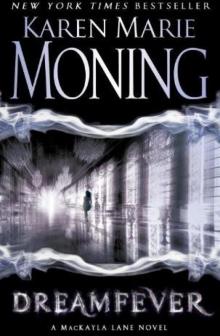 Dreamfever_The Fever Series
Dreamfever_The Fever Series The Highlander Series 7-Book Bundle
The Highlander Series 7-Book Bundle![[Highlander 04] - Kiss of the Highlander Read online](http://i1.bookreadfree.com/i1/03/29/highlander_04_-_kiss_of_the_highlander_preview.jpg) [Highlander 04] - Kiss of the Highlander
[Highlander 04] - Kiss of the Highlander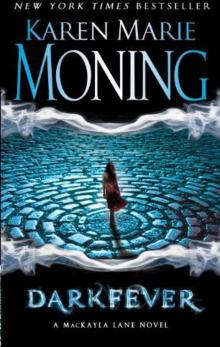 Darkfever_The Fever Series
Darkfever_The Fever Series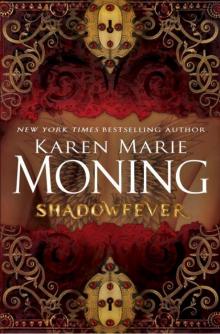 Shadowfever_Fever
Shadowfever_Fever Iced: A Dani O'Malley Novel (Fever Series)
Iced: A Dani O'Malley Novel (Fever Series)![Fever [08] Feverborn Read online](http://i1.bookreadfree.com/i2/04/09/fever_08_feverborn_preview.jpg) Fever [08] Feverborn
Fever [08] Feverborn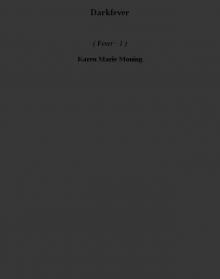 Darkfever f-1
Darkfever f-1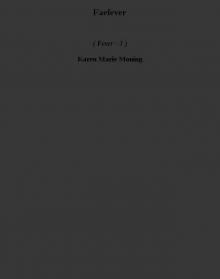 Faefever f-3
Faefever f-3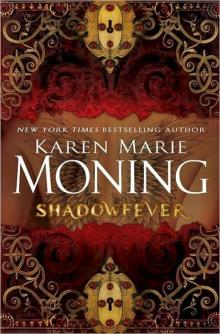 Shadowfever f-5
Shadowfever f-5 Bloodfever f-2
Bloodfever f-2